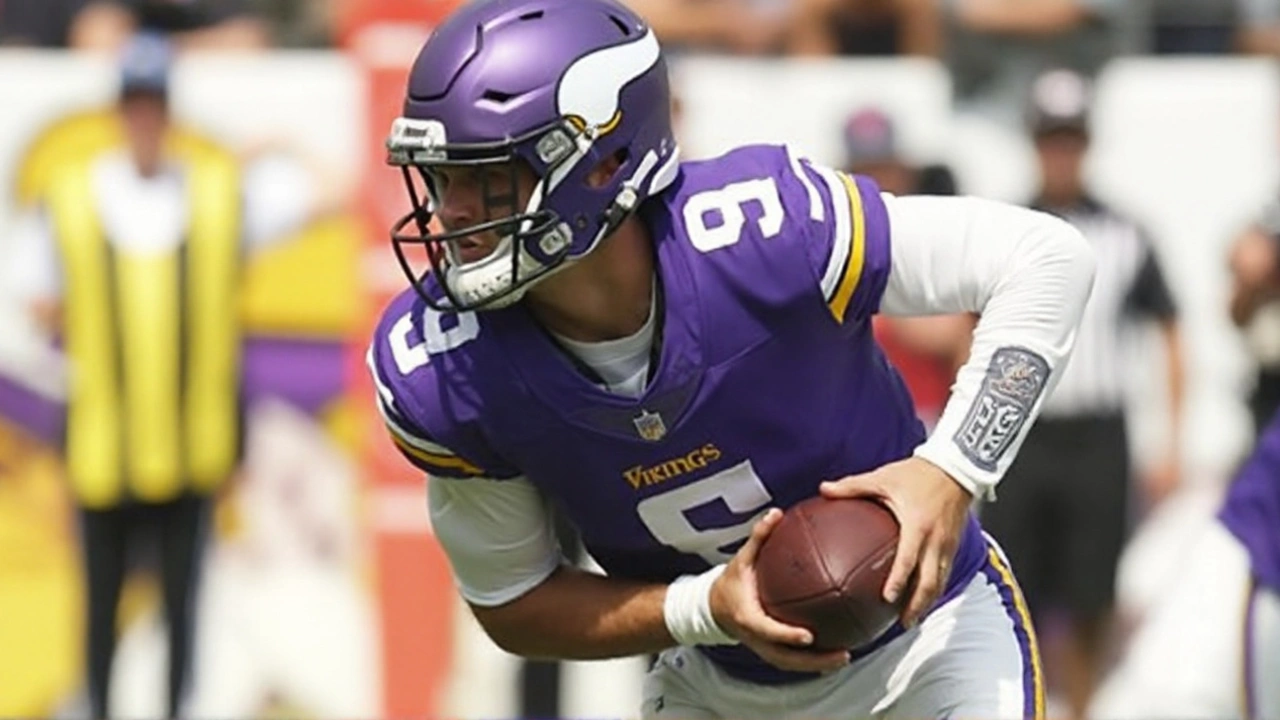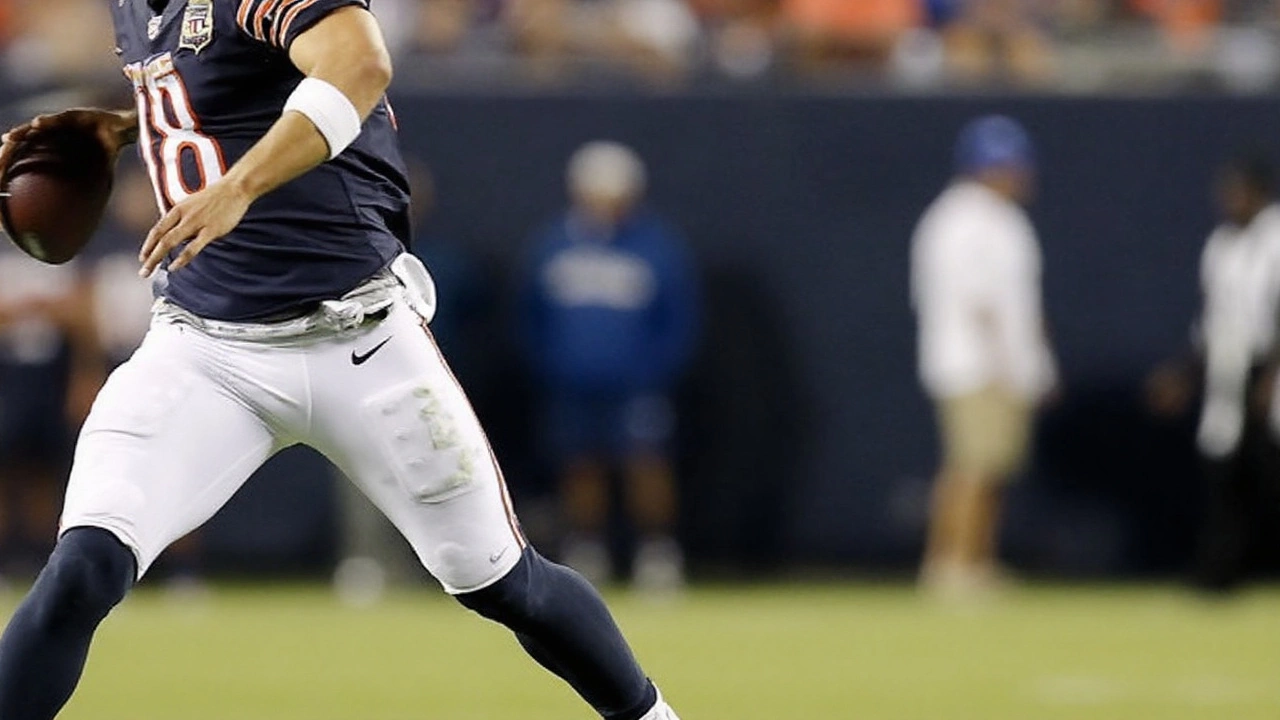A debut that nearly unraveled — and then flipped the game
For three quarters at Soldier Field, the story looked cruelly familiar: a hyped young quarterback, a loud road crowd, and a debut spiraling the wrong way. Then J.J. McCarthy turned Monday Night Football into a statement piece.
The Minnesota Vikings’ first-round pick, playing his first NFL game after missing his entire rookie year with a knee injury, pushed through an ugly start and engineered a 27-24 comeback win over the Chicago Bears. It wasn’t clean. It was gutsy, and it was loud. The kind of night that sticks with a locker room.
Early on, the Bears pinned McCarthy into predictable down-and-distance, and the game rushed at him. His worst moment came in the third quarter: a forced throw jumped by Nahshon Wright and returned 74 yards the other way. The pick-six put Chicago up 17-6 and sent a chill through a Vikings sideline already fighting field position and a lopsided time of possession.
Kevin O’Connell never blinked. At halftime, the Vikings head coach told his quarterback, “You are going to bring us back to win this game.” That wasn’t coach-speak. O’Connell leaned into it. He adjusted protections, called more quick game, and let McCarthy settle with defined reads. The payoff hit all at once.
The fourth quarter belonged to McCarthy and a Vikings offense that had only 49 snaps on the night but made the late ones count. He found Justin Jefferson to close the gap and change the feel of the night — a drive that finally got Minnesota on schedule and put Chicago’s defense on its heels. Then came the throw that flipped the scoreboard: a 27-yard strike to Aaron Jones with 9:46 left, a perfectly timed release that beat a late-rotating defender and gave the Vikings their first lead.
Chicago answered with urgency, but Minnesota’s special teams and defense bought their rookie quarterback one more shot. McCarthy took it. With 2:53 remaining, he kept the ball on a red-zone read and slipped through a crease for a 14-yard rushing touchdown — the winning score, and the one that shifted the night from survival to belief.
How did he get there after such a rough start? He played faster. He trusted the checkdowns when the shot plays weren’t there. He used his legs to escape and to threaten the edge. The staff trimmed the risk and let him layer in confidence one snap at a time. It was the same poise he showed at Michigan, but under brighter lights and heavier pressure.
There’s a reason this win will play well in the Vikings’ building. McCarthy hadn’t taken a meaningful snap since guiding Michigan past Washington for the 2023 national title. A year of rehab and waiting can twist a young quarterback’s mechanics and confidence. Instead, he delivered when the game got tight. Minnesota didn’t just draft a passer; it drafted a temperament. Monday night tapped into that.
The Vikings also got major help from the third phase. Veteran linebacker Eric Wilson knifed through for a blocked punt in the second half — the exact kind of momentum play O’Connell points to when he talks about complementary football. When you’re getting out-snapped and chasing the game, you need a spark from somewhere. Special teams gave it, and the offense cashed it in.
Key fourth-quarter beats that swung the night:
- Quick-game rhythm: slants, outs, and a moving pocket to calm protection and get McCarthy in rhythm.
- Jefferson touchdown: the star wideout winning leverage and resetting the sideline’s mood.
- 27-yard TD to Aaron Jones: timing and touch between levels, Minnesota’s first lead at 9:46.
- 14-yard keeper: McCarthy reading the end, tucking, and finishing through contact with 2:53 left.
Jefferson’s presence mattered, even beyond the touchdown. He drew coverage that opened windows for Jones and the secondary options, and his route discipline gave McCarthy clean answers. The Vikings didn’t need volume; they needed precision and clutch execution. They got both in the final 15 minutes.

Chicago’s bright flashes — and the issues that gave the game away
On the other side, the Bears left too much on the table. This was also the first game for new head coach Ben Johnson, and for long stretches, his offense dictated. Rookie quarterback Caleb Williams showed why Chicago invested its future in him: a first career rushing touchdown, a touchdown through the air, and the kind of escapability that turns broken plays into chunk gains. He led the Bears in rushing with 58 yards on six carries — a great sign for his playmaking, and a not-so-great sign for the run game around him.
D’Andre Swift never found a rhythm between the tackles, finishing with 53 yards on 17 carries — 3.1 yards per rush. When your lead back is grinding for threes and your rookie quarterback is your most explosive runner, the math gets hard on late downs. Chicago’s line got some push early, but the consistency wasn’t there when they needed to salt away a lead.
The hidden damage came before the snap. The pre-snap penalties that nagged the Bears through camp showed up in prime time: multiple false starts, wasted rhythm, and two timeouts burned because the play clock was threatening to zero. That’s free yardage donated in a three-point game. It also tilted Johnson’s play sheet into more obvious passing spots, which let Minnesota heat up the edges late.
Williams still did plenty to win with. He worked through progressions, found throws outside structure, and kept the Vikings honest with his legs. But the Bears couldn’t stack clean series together in the fourth quarter. When the game asked for four straight first downs to drain the clock, they blinked — a penalty here, a stuff at the line there, and suddenly the defense was back on the field against a quarterback who had found his rhythm.
Chicago’s defense, for its part, did a lot right for three quarters. The pick-six by Wright blew the roof off Soldier Field. The rush discipline was solid until Minnesota leaned into tempo. But explosive plays are ruthless equalizers. The Jefferson touchdown and the Jones strike came at high-leverage moments; both flipped field position and morale in a handful of snaps.
There were promising layers for the Bears to carry forward. Williams’ calm amid chaos. The defensive backfield’s early ball skills. The willingness to feature Swift despite the modest returns. But the blueprint to close games in this division is straightforward: fewer freebies before the snap and a run game that turns second-and-8 into third-and-manageable. Chicago didn’t hit that standard, and the Vikings made them pay.
Big picture, this was an early NFC North tone-setter. Minnesota leaves with confidence and a road win. Chicago leaves with proof that its quarterback can lift them — and a list of corrections that can’t wait. These races are often decided by the handful of snaps that separate good from good enough. Monday night put those snaps under a spotlight.
For the Vikings, the win is validation. They spent a top-10 pick on a quarterback who hadn’t played in over a year and asked him to deliver in one of the league’s nastiest environments. He struggled, then steadied, then stole it. That travels. And in a division where margins are thin, it matters that Minnesota found a way with only 49 offensive plays. Efficiency beats volume when the moments are pressure-packed.
McCarthy’s development from here will be about stacking answers: protection IDs, blitz tells, ball security, red-zone craft. He checked a few of those boxes in the fourth quarter. The staff helped. The stars helped. The defense and special teams took turns helping. That’s how you build a young quarterback without asking him to do too much too soon.
Chicago will have to solve the pre-snap stuff fast. Those penalties aren’t about talent; they’re about rhythm and discipline. That’s fixable — and it has to be, especially with a rookie quarterback whose best trait is turning pace into pressure on a defense. Cleaner operation gives Williams more snaps, more tempo, and more chances to make defenses choose wrong.
There’s also the run-game question. Swift is a talented space runner, and the Bears tried to lean on him. But if the interior push isn’t there, they’ll need to widen the menu — more motion, more misdirection, and more light boxes created by formation. Otherwise, late leads will keep slipping through the same crack Minnesota exploited.
None of that takes away from what Williams put on tape: touch, burst, and poise. He gave Chicago a lead and the spark to hold it. The rest of the operation didn’t keep up when it mattered most.
As for Minnesota, the locker room got what it came for: proof. Proof that their young quarterback can get off the mat. Proof that their coach can steady the plan when it’s getting away from them. Proof that special teams and defense can feed the offense when it’s stuck in second gear. One game won’t define a season, but this one will be remembered if the Vikings are still swinging in December.
It took three quarters of frustration and fifteen minutes of clarity. That’s often how a debut goes. The difference Monday night? McCarthy finished the job — and he did it on the road, against a rival, when the entire building knew the ball was in his hands.
